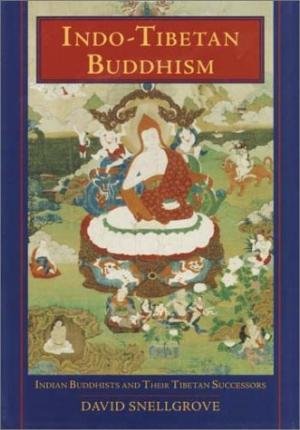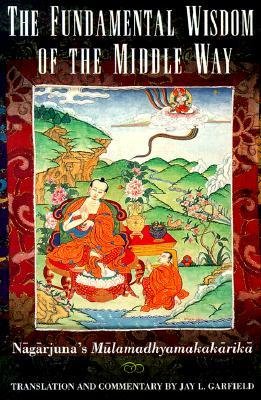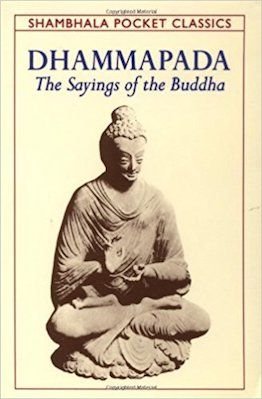I would like to share the top 5 books I recommend for anyone wanting to learn about or understand Buddhism.

This excellent book is a compilation of Buddhist scriptures from every corner of the Buddhist world, and spanning the entire history of the canon, from early Buddhist to Mahayana to Tantric texts. As well as sutras, or discourses, there are monastic and ritual texts, stories, historical texts, philosophical treatises, songs and poems. An excellent commentary accompanies each chapter, which helps put each text into perspective and build the reader's knowledge of Buddhist culture, history and doctrine.

This epic book is a masterpiece of scholarship by one of the 20th Century's leading scholars in Buddhist studies, David L. Snellgrove. It is certainly not for the beginner, but for anyone truly serious about understanding Buddhist philosophy, doctrine, history and its cultural context in India and Tibet, this book is the most authoritative and rigorous academic work you can find. In particular, the author dives into great detail analysing the complicated, and very challenging concepts presented by the Mahayana philosophical schools, as well as analysing the equally challenging body of Tantric literature in great length and great detail. It is a work without equal in its precision and depth of analysis, and the true standard of measure in Buddhist studies, a subject where so many introductions that exist for the popular market are just telling people what they want to hear.

This is by far the most difficult book on the list to read through. It's a translation of the Mūlamadhyamakakārikā by Nagarjuna, the founder of the Madhyamaka philosophical school. Reading this book is a dive into the mind bending philosophy of emptiness, the radical philosophical position of total non-existence of all mental and physical phenomena. It's structured as a series of dialogues, each applying critical analysis to a particular philosophical position and attempting to destroy it, and prove the inherent paradoxes contained in our most basic assumptions about thought and the nature of reality. Reading this book you come away feeling like the ground has fallen from beneath you, but if you are able to stare into the void without fear, it is the door to understanding the transcendental path of vision and insight in Buddhism.

This beautiful little book is my favourite edition of the Dhammapada, a collection of sayings of the Buddha that is one of the most widely read and best known Buddhist scriptures. It is an excellent little book to read because it's so short, and doesn't go into any complicated philosophy or doctrine, but is rather just a collection of simple and very profound gems of wisdom that can be appreciated by a complete beginner, as well as someone who has been studying Buddhism for years. It's a book you can keep coming back to again and again, and it's a book that's great to give as a gift to someone to introduce them to Buddhism for the first time.

This anthology is a collection of discourses, or sutras, from the Pali canon, which are believed to have been spoken by the historical Buddha, and which have been preserved in their present form by the Theravada Buddhist lineage. The full Pali canon is extremely long, and runs into many volumes and thousands of pages, but this a collection of some of the most famous sutras. These cover a wide range of themes, from the Buddha's early life, his enlightenment, and his first teachings; to the establishment of the sangha, or monastic community; the foundations of Buddhist doctrine, such as the Four Noble Truths, the Eightfold Path, Dependent Origination, and the law of karma; as well as many stories and anecdotes that illustrate the Buddhist teachings in practice. These sutras provide an excellent introduction to the mythology and culture of early Buddhism, as well as being the most authoritative and original sources for understanding the foundational concepts in Buddhist doctrine.
Reading all of these books will give you an excellent foundation in understanding Buddhist doctrine, philosophy, culture and history. There are so many books out there on the market, particularly around spirituality, but I believe these will give you a true compass heading, and hopefully inspire you to start your own journey on the Buddhist path of wisdom.
Thanks for this. For those interested in early Buddhism, another excellent book is "What the Buddha Taught" by Walpola Rahula. -John
Thanks for your comment! I've not read that one. I've tried to make this list really focused on primary sources as opposed to secondary interpretations, which I don't have much faith in, especially as time goes on and political correctness is increasingly narrowing down what you are and aren't allowed to say and print.
Your focus on primary sources is understandable. That said, the Rahula book is quite "orthodox".
Compassion is the key in Islam and Buddhism and Judaism and Christianity. They are profoundly similar.
Excellent post thanks for sharing.
Another nice post.. thanks
Thank you for taking the time to read my post!
Great compilation. Personally I like Dhammpadaya. It has lot of meaning and advice for real life situations.
I agree, the Dhammapada is wisdom that can be appreciated by anyone, regardless of religion or culture or beliefs, and that you can keep coming back to for advice, and keep reading again and again because it's so short.
Thank you for your comment @pulasthi!
thank you for sharing mr@adamantine
Thank you for taking the time to read my post @shawki! 👍
Thank you for this valuable information. I haven't read much about Buddhiism. I read a bit about Hidduism, in particular The Yoga Sutras Of Patanjali and a couple others.
I read that you are a frutarian in your header. I'm looking to make it there too.
I've done 6 months raw a couple year back. I'm now vegan for more than 2 years and I've been vegetarian for 5 years prior to this.
Hey @teamsteem great to hear from you! First I'd just like to say I'm a big fan of yours, and I'm glad we have someone who is willing to tackle difficult subjects like geoeningineering, vaccines and 9/11 as a witness here on Steemit. I just voted for you myself today! 👍
I really hope you get a chance to read some of these books. I spent 3 years studying Buddhism as part of my bachelor's degree in religious studies, as well as other religions, but Buddhism has something special that no others have. That is its universalism. In a sense it's the first decentralised religion.
The Buddha is lot like Satoshi Nakamoto. He set down a series of immutable rules, the Four Noble Truths, Dependent Origination, the law of karma, that explained the fundamental mechanics of the universe, but constructed a religion that did not require him in it, and did not require anybody to believe in any doctrine as an article of faith.
There is a story in the Buddhist scriptures of how the Buddha compared his teachings to a raft that helps you cross a river, but once you're on the other shore, you don't keep carrying the raft around with you, you let it go.
The real treasure at the end of the Buddhist path is fully decentralised, in a sense, because it is never given to you as something you can grasp on to. It is emptiness, and the peace and stillness that comes from seeing things as they are, which opens the door to transcendental vision.
If the Buddhist teaching were presented as a doctrine you had to believe in, if nirvana was taught to be heaven, and the Buddha some kind of God, then that would lead people to attachment, in the same way as whenever someone gets hold of power over the supply of money, that power eventually corrupts.
Buddhism is a philosophical and religious system set up to save us from ourselves. No other religion is structured in this way.
That's so great that you're open to the raw diet. I did know you were a vegan, I read that on some of your posts, but it's great that you're going raw too. I'm not 100% raw myself, but very, very close, definitely close enough to legitimately call myself a fruitarian, and I've been eating this way for 2 1/2 years! Today I've been 100% raw, I just ate a couple of watermelons, some nectarines and a couple of banana smoothies. I do eat a very small amount of cooked vegan food sometimes, just out of stress, and because I'm hustling so hard I get cravings, but that is basically what every day is like for me. Raw, mono fruit meals of tropical fruit.
If you're interested in learning more please check out Loren Lockman on YouTube. He's been a fully raw fruitarian for over 20 years, and runs one of the only water fasting centres in the world, in Costa Rica. Discovering his videos is what started me on this journey and I've been following his diet ever since.
https://www.youtube.com/user/LorenLockman/videos
Thank for the compliments. I know you voted for my witness. This appear on Steemd. This is what brought me to your blog. I'm now following you.
I never heard of Loren. I'll check it out.
Doesn't Buddhism come from Hinduism? What I read from Hinduism was pretty deep, in particular The Yoga Sutras Of Patanjalin. I recommend it if you haven't read it.
Have you ever experience psychoactive substances? I had very profound experiences with magic mushrooms.
I also had very intense experiences with meditation but I don't meditate regularly anymore. I sometimes have spontaneous trance from time to time. They don't last longer than a couple seconds but are very enjoyable.
atman, whereas Buddhism does not.Hey @teamsteem great to hear from you again! Yes, Hinduism and Buddhism do share a lot of similarities. The end goal of both religions is liberation from the cycle of reincarnation, but the main point on which they differ is that all forms of Hinduism recognise the existence of the soul, called the
In all Hindu religious traditions the soul, the atman, is identified with God, either as part of an impersonal divine consciousness, brahman, or a supreme, personified deity, such as Shiva or Vishnu.
Buddhism takes the absolute opposite view. In the Buddhist analysis existence has three fundamental characteristics, impermanence, suffering, and lack of inherent existence, or self. In Sanskrit this is anatman, no-self.
The point of enlightenment in Hinduism is the of the merging of the divine light within all of us into the ocean of the divine consciousness. In Buddhism is it emptiness, nothingness.
This may seem frightening, but the Buddhist path is much more powerful. Emptiness is a void which you must stare into, and which destroys everything that you are to finally, and completely tear out the root of craving and attachment, and leave you with only peace and stillness.
There is no end point, no end place in Buddhism. It gives you absolutely nothing to cling on to. Nirvana itself only means extinguishing, like the flame of a candle burning out once the wax has all been used up. What happens to the flame when it's gone?
I have experimented with magic mushrooms myself in the past, and had an incredible peak experience that felt like enlightenment at the time. Honestly though, eating a strict, raw, mono fruitarian diet gives you the same high, even better actually. It's honestly like being on psychedelic drugs all the time!
I do also meditate, and my diet helps a lot with that too. When you eat a very clean and pure diet, it becomes very easy to still the mind, for anyone. It happens naturally. Eating a diet of even very light, healthy cooked food unsettles the mind. I notice the difference immediately, it's like night and day.
I know what you mean about the trance, I've fallen into it myself from time to time. I do find myself wanting to recreate that experience again though, and getting attached to it, when really there should be no end goal in meditation, other than to just be still and peaceful.
I just literally wrote Buddhism has been given to us to save ourselves in my latest post I will be posting in a couple hours. I like the way you express your love and interest of The Noble Eightfold Path.
Well, you can totally have look at EPK (Eric Pema Kunsang) collection. He's a great translator and practitioner of Mahayana.
His site here http://www.erikpemakunsang.com/
Thank you for your suggestion and input @jakes.steve!
It is useless to worry on temporary comforts. Buddhism is there to permanent freedom.
Yes, I agree, attachment to the material world is the cause of suffering. All things are impermanent, we must focus on achieving the state of peace, and freedom from death and rebirth.
That's a great quote @ainal, thank you for sharing!